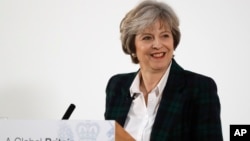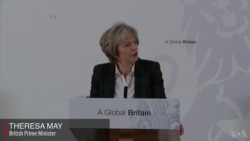For months, detractors and opponents of Brexit, Britain's pending departure from the European Union, had accused Prime Minister Theresa May of not having a plan to leave the regional bloc.
On Tuesday, Prime Minister May laid out the objectives of what is now clearly going to be a hard Brexit, or clean break that means leaving the single EU market and breaking with the European Court of Justice, as well as assuming control of borders to address the immigration concerns underpinning support for the move.
May said a final deal will be put to parliament for a vote. If approved, the deal would call for a phased implementation.
May’s government is due to trigger the formal, two-year process in March, and begin negotiations to disengage and dissolve arrangements covering everything from trade to immigration and travel.
May's commitment
The speech put an end to months of speculation on whether the prime minister would go ahead with a hard Brexit or opt for what observers termed a “one-foot-in, one-foot-out” arrangement.
May said Britain will want to pursue a free-trade agreement with the European Union.
“This agreement should allow for the freest possible trade in goods and services between Britain and the EU's member states. It should give British companies the maximum freedom to trade with and operate within European markets, and let European businesses do the same in Britain,” said May.
“But I want to be clear: What I am proposing cannot mean membership of a single market,” she said.
May also said Britain will propose an arrangement allowing for freedom of travel between its territory and the remaining 27 EU member states.
'Truly global Britain'
“I want us to be a secure, prosperous, tolerant country, a magnet for international talent,” May said, adding that Britain would pursue an arrangement in which its nationals could travel freely to the EU as they do now. “You will still be welcome in this country as we hope our citizens will be in yours.”
May said any deal, though, must ensure that Britain can control the number of people who travel there from Europe, a key issue among many of those who voted back in June in favor of Brexit.
The British pound tumbled Monday to a new 31-year low in anticipation of May’s announcement of a break with the European single market, but rose again on Tuesday after the prime minister’s speech.







